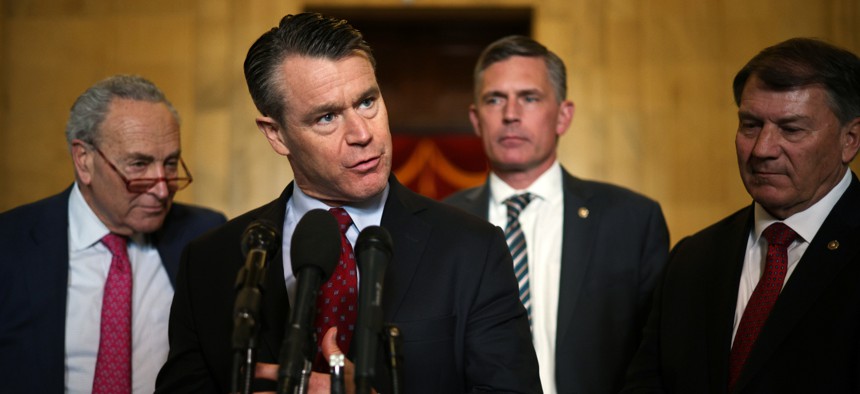Senate committees to start marking up AI bills soon, senator says

U.S. Sen. Todd Young (R-IN) speaks as (L-R) Senate Minority Leader Sen. Chuck Schumer (D-NY), Sen. Martin Heinrich (D-NM) and Sen. Michael Rounds (R-SD) listen after a meeting on AI at the Kennedy Caucus Room at Russell Senate Office Building on November 1, 2023. Young said on Feb. 29 that Senate committees should expect to start marking up AI legislation soon. Alex Wong/Getty Images
One of the Republican members of the bipartisan AI working group estimated that major Senate committees will begin marking up AI-related legislation “in March or April.”
Major Senate committees are likely to begin marking up legislation related to artificial intelligence within the next two months, according to Sen Todd Young, R-Ind., one of the leaders of a bipartisan working group in the upper chamber that has been focusing on AI.
Senate Majority Leader Chuck Schumer, D-N.Y., established the working group last year “to lead on this issue” of potential AI regulations. The group includes Schumer and Young, along with Sens. Martin Heinrich, D-N.M., and Mike Rounds, R-S.D.
As part of their work, the four lawmakers hosted a series of nine “AI insight forums” last year that invited tech leaders, academics and other outside experts to discuss important issues related to AI — including privacy, national security and intellectual property — with senators in closed-door sessions.
During a conversation with Young and Sen. Mark Warner, D-Va., hosted by Punchbowl News on Thursday, Young said he and Rounds “visited with every ranking member of a major committee yesterday,” telling them that “‘we're about to produce our lessons learned through these insight forums, we're going to hand them to this prominent committee ranking member and chairman and ask you to get started marking up legislation as it relates to AI’ — probably in March or April, would be my estimate.”
Young said he expects this effort to entail key panels — such as the Senate Intelligence and Senate Armed Services committees — crafting separate bills that are then bundled together into one package, which he said would allow for senators “to spend weeks and weeks considering individual smaller bills and member initiatives that align with that AI theme.”
While he acknowledged that “it's a complicated political environment,” Young said “even in this day and age, when we really need to act on national security issues, we figure out a way to get it done” and added that he believes “for the most part, this will be a nonpartisan issue.”
Warner — who has introduced or co-sponsored several bipartisan bills to address issues like the impact of AI on financial markets and worked with Young on the CHIPS and Science Act — said he agreed with his GOP colleague that “it's going to be less Democrat-Republican, less left-right and more future-past in terms of how we think about these tools,” but cautioned that “our record on this stinks” when it comes to Congress successfully passing laws around issues related to social media and tech companies’ content moderation policies.
Both lawmakers, however, voiced optimism that ensuring the U.S. remains at the forefront of global innovation, while also addressing some of the concerns around AI’s impact, will lead to regulatory action.
Young said he envisions lawmakers working to address consumer protection concerns and AI’s impact on privacy and civil rights, but that “we're really going to ensure that those laws that we've already passed are suitable to an AI-enabled world.”
He added that “most of that work, as I see it, will occur within agencies,” with Congress largely “giving some new authorities to different departments of government,” such as the National Institute of Standards and Technology. Young said that additional AI-related funding for government and university research will also likely be needed “so that we can leverage the amazing power of this new technology.”
Warner also agreed that “there are already laws that exist” that can be updated to account for increasing uses of AI, but said the impact of emerging technologies on elections and financial markets were two particular areas of concern for him when it comes to the question of “where can AI tools today have the most dramatic effect.”



